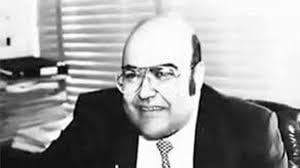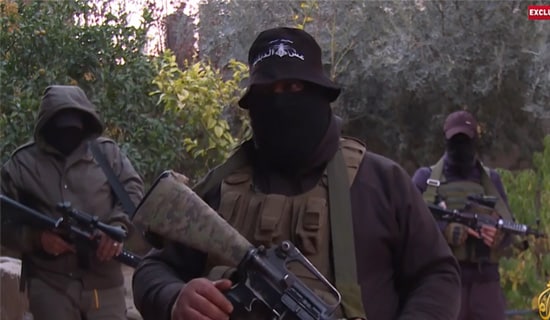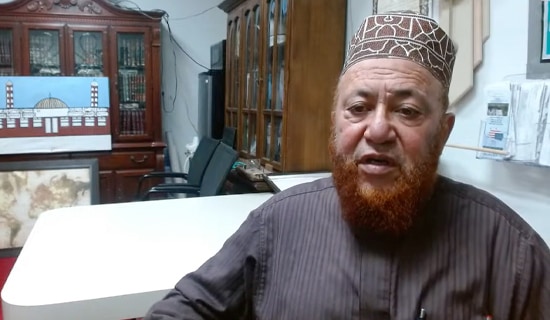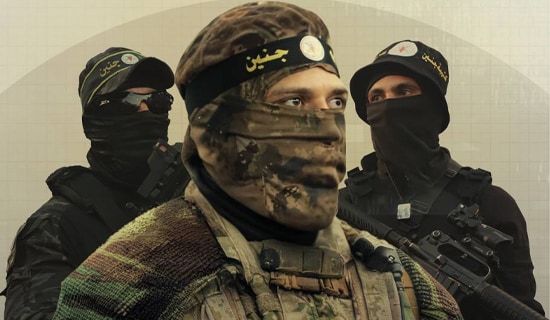On June 15, 2020, the Qatari Al-Jazeera network aired a 45-minute documentary on the assassination of liberal Egyptian intellectual Farag Foda, who was murdered on June 8, 1992 by two members of the Islamist organization Al-Gama'a Al-Islamiya.[1] Foda's assassination came after a prolonged campaign against him by prominent Islamists, who proclaimed him an apostate for his progressive views, such as his support for the separation of religion from the state.
The Al-Jazeera documentary, produced in 2012, includes a reenactment of the assassination and its planning, archival footage of Foda, and interviews with several figures, including Egyptian researchers and senior Al-Gama'a Al-Islamiya member Nageh Ibrahim. Another figure who is interviewed at length in the film is Abu Al-'Ela 'Abd Rabbo, the organization member who provided Foda's assassins with their weapons. He was sentenced to life in prison but was released in 2012 as part of a general amnesty granted by then-Egyptian president Muhammad Morsi, of the Muslim Brotherhood (MB). It should be noted that in 2014 'Abd Rabbo left Al-Gama'a Al-Islamiya due to ideological disagreements with the movement and joined ISIS. He was killed in Syria in March 2017.[2]

Farag Foda (Source: English.alarabiya.net)
In the last part of the documentary the narrator says that Foda's murder "brought peace to both sides," because "the killers of Farag Foda were rid of his tongue and his thoughts, while he was rid of all the troubles of this world." This is followed by comments from Al-Gama'a member Nageh Ibrahim, who warns that "the leaders of secular thought must not go to extremes, which gives rise to radicalization on the other side," and from 'Abd Rabbo, who declares that he does not regret his involvement in the assassination.
To watch a MEMRI TV clip of excerpts from the documentary, click below:
The documentary sparked intense criticism against the Qatari Al-Jazeera, which has often been accused of supporting terror and extremist organizations. The critics, mostly journalists and columnists, wrote that the documentary purports to be objective, but in practice is heavily biased in favor of Foda's Islamist opponents who support his murder: it grants them ample screen time to express their views, while deliberately neglecting to mention the campaign against Foda by Al-Azhar, Al-Gama'a Al-Islamiya and other Islamist elements that led to his murder. They add that the documentary effectively justifies the assassination by presenting the killers as pious young men and Foda as a recklessly radical secularist. It thus incites to kill other liberal intellectuals who fight for a civil state and against religious coercion and extremism.
The following are translated excerpts from some of these articles.
Yemeni Author: The Film Expresses Support For The Assassins And Helps To Obliterate Foda's Ideas
Yemeni author, journalist and human rights activist Hussein Al-Wade'i attacked the makers of the Al-Jazeera documentary, who he said used sophisticated editing techniques to present Farag Foda's killers in a neutral and even positive light. He wrote: "The Assassination of Farag Foda aired on Al-Jazeera's documentary channel on June 15, 2020, [a week after] the 28th anniversary of the murder. The film's trailer tried to present it as objective, but a critical examination of its direction methods, and the choice of interviewees and audio segments in it, clearly exposes its bias in favor of the jihadists who murdered Foda and of the 'moderate' Islamists who were behind them, and its support for their views. Anyone even slightly familiar with methods of analyzing media content knows that there are many ways to support and promote a particular point of view, which can be used cleverly so that the viewers do not even notice them… [and] this film definitely made clever use of them.
"In terms of the interviewees, there was a majority of figures representing an ideology hostile to Foda's: six speakers with hostile views, verses only four who defended him. But that is not the main point. Most of the figures chosen to represent the jihadist view were eloquent speakers who made their points well, whereas the figures who supported Foda were weak… A third cunning method involved the selection of recorded interviews. The jihadists were represented by strong and coherent recordings, whereas the interviewees defending Foda were presented in confused and disconnected segments… The fourth method used by the film to promote the view that favors the assassination was giving more [screen] time to the proponents of the jihadist views. The terrorist Abu Al-'Ela had the most [screen] time by far, while the filmmakers made not the slightest effort to [present any] responses to the claims and lies he constantly repeated.
"This brings us to the fifth method used by the immoral media industry, which is presenting [Foda's] rival as a neutral witness! Yes, the film presented the terrorists of the Al-Gama'a Al-Islamiya [organization] who planned and carried out the assassination as 'neutral' witnesses, and was full of dangerous hadiths and terrorist [religious] rulings presented as opinions!...
"The filmmakers presented Al-Gama'a Al-Islamiya as a peaceful organization for spreading Islam that was persecuted by the [Egyptian] regime, which killed 2,000 of its members! This position was expressed in the film by Nageh Ibrahim, [another] Al-Gama'a Al-Islamiya terrorist, and in this case too, the filmmakers failed to make the slightest effort to present any proof for his claims. At the same time, it cunningly presented every kind of false evidence to convince the viewers that the assassination had been the personal initiative of a few 'zealous young men' and that Al-Gama'a Al-Islamiya had no part in it. The film even concealed the fact that religious rulings [had been issued sanctioning] the murder, including one by the head of Al-Gama'a Al-Islamiya, 'Omar 'Abd Al-Rahman. As for Foda [himself], the film presented him as a provocative philosopher and as a fool who had brought perdition upon himself…
"Is that all? [No!] The worst part is still ahead! The film also uses the knockout method… The knockout argument of a scene, as anyone in the field of media knows, is the strongest claim and the idea one wishes to market or stress. The worst part of this film is its final ten minutes, which describe the events immediately following Farag Foda's assassination. In this segment the filmmakers threw caution to the wind. All the voices and figures who defended Foda vanished, and the jihadists dominated until the very end of the film… In these [final] moments, the filmmakers made four terrorist knockout arguments:
"The first was the most loathsome terrorist line I have ever heard: 'And thus, the murder was beneficial for both sides. Farag Foda's rivals were rid of his ideas and his tongue, and the man [himself] was rid of all the troubles of this world'! Describing the murder in these terms, as though the victim benefitted from his own death, is one of the most despicable media views I have ever encountered, and the Egyptian Journalists Syndicate should prosecute dangerous media figures of this kind.
"The second knockout argument was the comment that 'the court verdicts were the end of the story.' The film obviously means to convey that, with Foda dead and those charged [with his assassination] executed, the story of Foda, as a man but also as a philosopher, is over. This is a point the Islamists have been promoting for over 28 years. It is an attempt to follow up his physical assassination with a moral one and bury his ideas forever.
"The film's third terrorist knockout argument was the comment made by the terrorist Nageh Ibrahim at the end of the film: 'the leaders of secular thought must not go to extremes, which gives rise to radicalization on the other side'… This means, 'Do not think and do not criticize, lest you meet the same fate as Farag Foda.
"[But] the most important terrorist knockout argument at the end of the film was a comment by Abu Al-'Ela, who was presented as a 'noble terrorist' who sacrificed his life, wealth and youth for the cause. At this point the camera zoomed in on him, and anyone familiar with the language of film knows that a close-up expresses sympathy for the subject. The assassin's features could be seen [very clearly], his voice quavering and his face shining with piety. As the film's rousing theme music began to play, he declared that his deed was intended to please Allah. This completed the picture [painted] by this media creation, which did everything it could to justify terror, glorify the terrorist and present him as a noble and zealous young man who did what he did in defense of his faith and his god…
"There is one further aspect of the film's bias, achieved through the method of concealment… [The film] concealed the extensive web of incitement that preceded Foda's assassination, and involved Muhammad Al-Ghazali,[3] Mahmoud Mazrou'a,[4] 'Abd Al-'Aziz Ghaffar [sic],[5] [Muhammad Metwali] Al-Sha'rawi, Muhammad 'Imara,[6] and Al-Azhar [as a whole]… as well as Saleh Abu Isma'il,[7] Sheikh Gad Al-Haq ['Ali Gad Al-Haq][8] and a group of other jihadists and Salafis…
"The film was produced in 2012… [after] the MB gained power in Egypt and [then-president Muhammad] Morsi released jihadists who had been sentenced [to prison] for involvement in terror. The film was part of an attempt to morally assassinate this intellectual – because the vengeful Islamist sentiments against him have not abated to this day."[9]
Egyptian Journalist: The Film Is A Professional And Media Disgrace, It Incites To Kill Intellectuals
In an article titled "Al-Jazeera Documentary on Farag Foda Praises the Murderers and Justifies Terror," Egyptian journalist Hisham Al-Naggar wrote that the film effectively incites to murder intellectuals: "A documentary called 'The Assassination of Farag Foda', aired on Qatar's Al-Jazeera… reflected the resounding failure of this channel, which tried to exonerate the killers while conveying that this Egyptian thinker [Foda] deserved to be murdered for being a radical secularist. The documentary was produced in 2012, at the height of Islamist victories and arrogance following the rise to power of the MB [in Egypt] and amid the vengeful Islamist media discourse that was meant to raise the morale of the jihadists and attain some final victories against anyone who [still] stood in the way of their [ideological] enterprise. Eight years after it was filmed, Al-Jazeera pulled it out of its archives to air it. The timing underlines how low the morale of the jihadist political Islam movement [has sunk].
"The makers of this documentary, which supports the MB and the jihadists, tried out new demagogical [methods in its effort to confront] the constant rise in the number of proponents of enlightened thinking, seven years after the MB's fall from power in Egypt. [They] used technical methods, such as editing the interviews and presenting them in a way that supports the perspective of Farag Foda's murderers… Trying to project the past reality of the 1980s and 1990s over today's reality, Al-Jazeera attempted to hint to the simple viewer that today's intellectuals and reformists, and the political enterprise they represent, are nothing but a direct continuation of Farag Foda, while distorting [the latter's] record and disparaging his philosophy. [Foda] was presented in the film from the perspective of the takfiris [Muslims who accuse their fellow Muslims of heresy] and of his MB opponents, as one whose philosophy was confused and who hated Islam, and was a wicked and irresponsible fool…
"This audio-visual charade, which concealed a professional and journalistic failure, was a display of vicious propaganda that incites to murder philosophers and to transform [our] intellectual and cultural arena from its very foundations. This enlightened and objective thinker [Foda], who was ahead of his time and fought to purge religion of extremism and violence so as to prevent it from being used for worldly purposes, and who foresaw everything that would happen following the Islamists' rise to power in 2012, was presented as one who deserved to be murdered and as an idiot and a radical… Conversely, the takfiris who think murder is licit became heroes and pious fighters who should be condoned and praised for their courage, their daring and their loyalty to their faith…
"The makers of this film… want to keep enlightened intellectuals and thinkers from performing their duty of purging the ideological arena of the filth and coercion [of extremism], defending the model of the modern civil state and exposing the [extremists'] tactics, [which involve] politicizing religion, unilaterally imposing ideas and suppressing human rights… Al-Jazeera once again found itself swimming against the current. Deliberately ignoring the [only] rational reason to mark the anniversary of Farag Foda's assassination – [which is to praise this man,] who sacrificed himself for the sake of the fight against closed-mindedness and terror and paid with his life for the right to defend his freedom of opinion – Al-Jazeera pushed to support the murderers… "[10]
Moroccan Journalist: The Al-Jazeera Film Honors Terrorists And Murder, Is Tantamount To "Mutilating The Body Of The Murder-Victim"
Moroccan journalist Hamid Zayd likewise slammed the film and wondered why nobody was holding Al-Jazeera to account. He wrote: "The Al-Jazeera documentary on Farag Foda honored terror and murder. It was a professional act of bloodsucking, a journalistic act of swimming in blood and mutilating the body of the murder victim. It was just as heinous as the criminal [assassination] it praised and whose perpetrators it favored. It was an opportunity to murder Farag Foda all over again and eagerly aim weapons at his dead body. Al-Jazeera rejoiced in the crime [of his assassination], and conveyed that Foda deserved what he got.
"Al-Jazeera interviewed the murderer and let him have the last word… The murderer was prominently featured [in the film] and got all the screen time. He was honored as a hero... [According to the film, his only] crime was his worldview, which was challenged by the [other] speakers [in the film]. He spoke freely and with a clear conscience, [and] Al-Jazeera was his window [to the world]. It gave him a home. It was his platform and his state.
"Al-Jazeera's editing [created the impression] the other murderers responsible for this act of terrorism, the assassin's accomplices, [likewise] had every justification: They were young and eager, and Farag Foda provoked them. He is the one who was mistaken. He is the one who advocated a civil state. He is the one who wrote in the paper, and he is the one who got what he deserved. As for the murderer, he was only carrying out God's law, and all he wanted was to be rewarded with Paradise for killing Farag Foda. He felt no remorse. These statements – yes, these statements – were the ones that concluded the program. [The assassin's] Al-Jazeera channel honored him. He [came off as] charismatic and completely innocent. He found someone to listen to him, spread his word, support him and condemn the victim.
"Al-Jazeera [thus] completed its campaign of [condemning] the murder victim and supporting the murderer, the Al-Gama'a Al-Islamiya [organization], the criminals and the acts of terror… This is unprecedented and dangerous. [Yet] nobody is holding the channel to account or asking about this. Nobody is telling the channel that this documentary glorifies terror and treats murder as a natural [act]. This [surely] pleases the Islamists…
"On the anniversary of Farag Foda's assassination, Al-Jazeera extolled the crime and its perpetrator, and carried out a journalistic act of assassination against the victim…"[11]
[1] Foda's assassins were Ashraf Sa'id Ibrahim, who drove the motorcycle from which Foda was shot, and 'Abd Al-Shafi Ahmad Ramadan, who fired the gun. Both were later sentenced to death and executed.
[2] 24.ae, March 26, 2017; albawabhnews.com, March 24, 2017.
[3] An Islamic scholar who carried out a number of positions at Al-Azhar. He regarded Foda an apostate and testified in the trial of his assassins.
[4] Head of the Al-Azhar Clerics Panel, who likewise accused Foda of apostasy.
[5] The reference is to 'Abd Al-Ghaffar 'Aziz, who preceded Mazrou'a as head of the Al-Azhar Clerics Panel.
[6] Egyptian sheikhs who opposed Foda and expressed support for his assassins after his murder.
[7] An Egyptian religious scholar and politician who likewise opposed Foda's ideas.
[8] The Sheikh of Al-Azhar between 1982 and 1996.
[9] Marayana.com, June 17, 2020.
[10] Al-Arab (London), July 2, 2020.
[11] Goud.ma, June 18, 2020.





